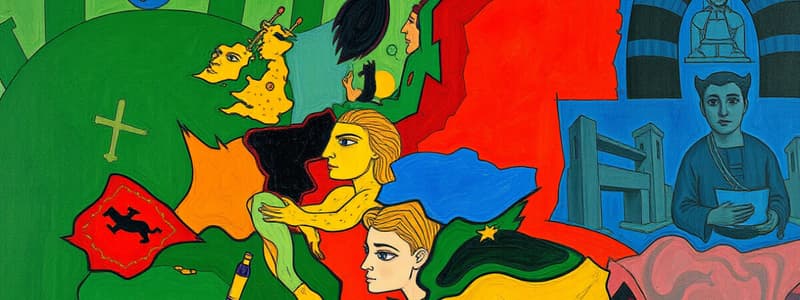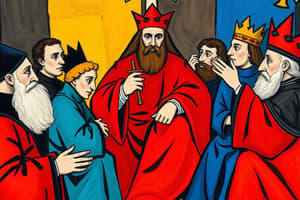Podcast
Questions and Answers
Which of the following explorers was the first European to reach the Pacific Ocean?
Which of the following explorers was the first European to reach the Pacific Ocean?
- Christopher Columbus
- John Cabot
- Vasco Nunez de Balboa (correct)
- Ponce de Leon
What major economic philosophy sought to maximize a country's wealth through trade, monopolizing resources, and strict regulation during the Age of Exploration?
What major economic philosophy sought to maximize a country's wealth through trade, monopolizing resources, and strict regulation during the Age of Exploration?
- Feudalism
- Socialism
- Capitalism
- Mercantilism (correct)
What significant event marked the end of the Counter-Reformation and its impact on Catholic countries?
What significant event marked the end of the Counter-Reformation and its impact on Catholic countries?
- Treaty of Westphalia (correct)
- 30 Years War
- Banishment of Jesuits
- Council of Trent
Which item was NOT introduced to the Old World during the Columbian Exchange?
Which item was NOT introduced to the Old World during the Columbian Exchange?
Who is credited with developing the scientific method, which emphasized structured experiments and observation?
Who is credited with developing the scientific method, which emphasized structured experiments and observation?
What was one of the significant societal changes brought about by the Protestant Reformation?
What was one of the significant societal changes brought about by the Protestant Reformation?
Which theologian is associated with the belief in predestination during the Protestant Reformation?
Which theologian is associated with the belief in predestination during the Protestant Reformation?
What was a core belief of the protesters against the Catholic Church during the Reformation?
What was a core belief of the protesters against the Catholic Church during the Reformation?
What was the purpose of the Council of Trent during the Catholic Reformation?
What was the purpose of the Council of Trent during the Catholic Reformation?
Which group believed in adult re-baptism during the Protestant Reformation?
Which group believed in adult re-baptism during the Protestant Reformation?
What concept replaced geocentrism during the Scientific Revolution?
What concept replaced geocentrism during the Scientific Revolution?
Which of the following thinkers is closely associated with empiricism?
Which of the following thinkers is closely associated with empiricism?
What was a common characteristic of enlightened absolutists?
What was a common characteristic of enlightened absolutists?
What significant idea did John Locke contribute to political theory?
What significant idea did John Locke contribute to political theory?
Which period marked the beginning of the Enlightenment?
Which period marked the beginning of the Enlightenment?
What did the concept of a mechanistic universe imply?
What did the concept of a mechanistic universe imply?
What role did the Protestant Reformation play in the Enlightenment?
What role did the Protestant Reformation play in the Enlightenment?
What was the significance of Isaac Newton's publication during the Scientific Revolution?
What was the significance of Isaac Newton's publication during the Scientific Revolution?
Which of the following best describes the scientific method developed during the Scientific Revolution?
Which of the following best describes the scientific method developed during the Scientific Revolution?
What was Galileo Galilei's most significant contribution to astronomy?
What was Galileo Galilei's most significant contribution to astronomy?
What role did the Scientific Revolution play in the relationship between science and the Church?
What role did the Scientific Revolution play in the relationship between science and the Church?
Which scientific discipline saw particular advancements during the 16th and 17th centuries due to empirical methods?
Which scientific discipline saw particular advancements during the 16th and 17th centuries due to empirical methods?
How did Copernicus' heliocentric model challenge previous views of the universe?
How did Copernicus' heliocentric model challenge previous views of the universe?
Which philosophical approach did Sir Francis Bacon emphasize in the development of the scientific method?
Which philosophical approach did Sir Francis Bacon emphasize in the development of the scientific method?
What impact did the Scientific Revolution have on mathematics?
What impact did the Scientific Revolution have on mathematics?
Flashcards are hidden until you start studying
Study Notes
Protestant Reformation
- Initiated by Martin Luther in 1517 with the publication of the Ninety-Five Theses, challenging Catholic Church practices, particularly indulgences.
- Led to a significant decline in papal authority and the Catholic clergy's influence in Europe.
- Resulted in an emphasis on education for both genders and a movement towards independent thought.
- Introduced new rights for women, including the ability to divorce and remarry.
- Many peasants remained unchanged despite revolts, reflecting limited impacts on their everyday lives.
- Key reformers included John Calvin, a French theologian advocating for predestination.
- The movement spurred the Catholic Reformation, with the Council of Trent addressing Protestant critiques and reaffirming Catholic doctrines.
- Jesuits emerged as a key group during the Catholic Reformation, promoting education and missionary work.
Age of Exploration
- Marked by European exploration from the 15th to 18th centuries, expanding to the Americas.
- Christopher Columbus's 1492 voyage reintroduced the Americas to Europe and initiated the Columbian Exchange, involving the transfer of people, goods, and diseases.
- Other notable explorers included John Cabot (claimed North America for England), Vasco Núñez de Balboa (first European to reach the Pacific Ocean), and Ponce de León (explored Florida).
- Positive effects of exploration included the introduction of new food sources, while negative effects included the destruction of Native American societies and cultures.
Columbian Exchange
- Defined as the exchange of various entities between the Old World (Europe, Africa, Asia) and the New World (Americas).
- New World contributions to the Old World included turkeys and tomatoes; in contrast, the Old World provided sugarcane and coffee.
- Introduced both beneficial new resources and detrimental consequences such as slavery and disease.
Key Concepts and Terms
- Commerce: The act of buying, selling, or trading goods and services.
- Mercantilism: An economic theory advocating for the accumulation of wealth through strict trade regulations and resource monopolization.
- Transatlantic Slave Trade: Involves the exchange of enslaved people between Europe, Africa, and the Americas.
Scientific Revolution
- Occurred from the 16th to 17th centuries, characterized by a shift in scientific thought and methodology, emphasizing empirical evidence and experimentation.
- Key figures included Copernicus (heliocentric theory), Galileo Galilei (telescope advancements and heliocentrism), and Isaac Newton (laws of motion and gravity).
- The scientific method became the foundation for systematic observations and experiments, distinguishing science from religious and philosophical reasoning.
Enlightenment Era
- Spanning the late 17th to early 19th centuries, this period emphasized individualism, reason, and skepticism over traditional religious authority.
- Influenced by earlier movements like the Renaissance and Scientific Revolution.
- Key thinkers included John Locke (social contract theory), Voltaire (advocate for freedom of speech), and Montesquieu (separation of powers).
- The period fostered revolutionary ideas leading to movements against tyranny and societal inequalities.
Enlightened Absolutism
- Characterized by monarchs who attempted to incorporate Enlightenment principles into governance, balancing authoritarian rule with progressive policies.
- Enlightened despots often enacted reforms not necessarily for the populace's benefit but to justify their rule.
- Notable enlightened absolutists included Catherine the Great, Frederick II, and Joseph II, who promoted arts, education, and civil freedoms.### Hobbes and Locke
- Both Hobbes and Locke were influential English philosophers born in the decades before the English Civil War, having attended Oxford University.
- Hobbes was an advocate for absolute monarchy, viewing it as the ideal government, while Locke supported the Parliament, earning him the title "Father of Liberalism."
- Hobbes described life in the state of nature as "nasty, brutish, and short," contrasting with Locke's belief that it was characterized by justice, liberty, and equality.
- The social contract for Hobbes involved granting absolute power to a ruler, whereas Locke's version allowed for the ruler to protect citizens' rights with conditional power.
- Hobbes argued that humans should use reason to exit the state of nature and accept the monarch's authority, while Locke believed in exercising fundamental rights such as life, liberty, and property.
- For Hobbes, monarch authority was unquestionable, while Locke maintained that a ruler's power must be consented to by the governed and can be revoked for abuse.
- Hobbes authored "Leviathan," while Locke's "Two Treatises of Government" significantly influenced the American political system and Thomas Jefferson.
René Descartes
- Descartes was a French philosopher and scientist who challenged conventional beliefs in education and science, advocating skepticism of established truths.
- He introduced three arguments of doubt to encourage critical thinking about perceptions and asserted that doubt reinforces the existence of a thinking mind.
- Descartes’ concept of a perfect God was pivotal in his argument, suggesting that the idea of perfection implies the reality of such a being.
- His work addressed the tension between religion, philosophy, and science, leaving a lasting impact on future intellectual discourse.
The Enlightenment
- The Enlightenment was an intellectual movement in the 18th century focused on reason as the basis of authority and knowledge, challenging established political and religious norms.
- It promoted individualism and skepticism towards traditional knowledge sources like the Church and monarchies, advocating for democratic governance.
- Key thinkers like Locke and Rousseau contributed to social contract theory, positing that legitimate governments arise from agreements between the rulers and the ruled.
- Enlightenment ideas influenced revolutions, particularly in America and France, which aimed to dismantle traditional monarchies.
- The period featured a debate between empiricists, who valued sensory knowledge, and rationalists, who relied on logical reasoning.
- Locke's notion of "tabula rasa" suggested that individuals are born without innate ideas, developing thoughts through experience.
Essential Questions in World History
- Essential questions guide teaching and inquiry in world history, focusing on major themes and concepts that explain societal development.
- Examples of essential questions include the impact of individuals on history, community evolution, global responsibilities, and the development of economic systems.
- Questions also examine human rights evolution, government structures, conflict causes, and lessons learned from wars.
- Such questions encourage critical thinking and a deeper understanding of the complexities in human history.
Studying That Suits You
Use AI to generate personalized quizzes and flashcards to suit your learning preferences.




